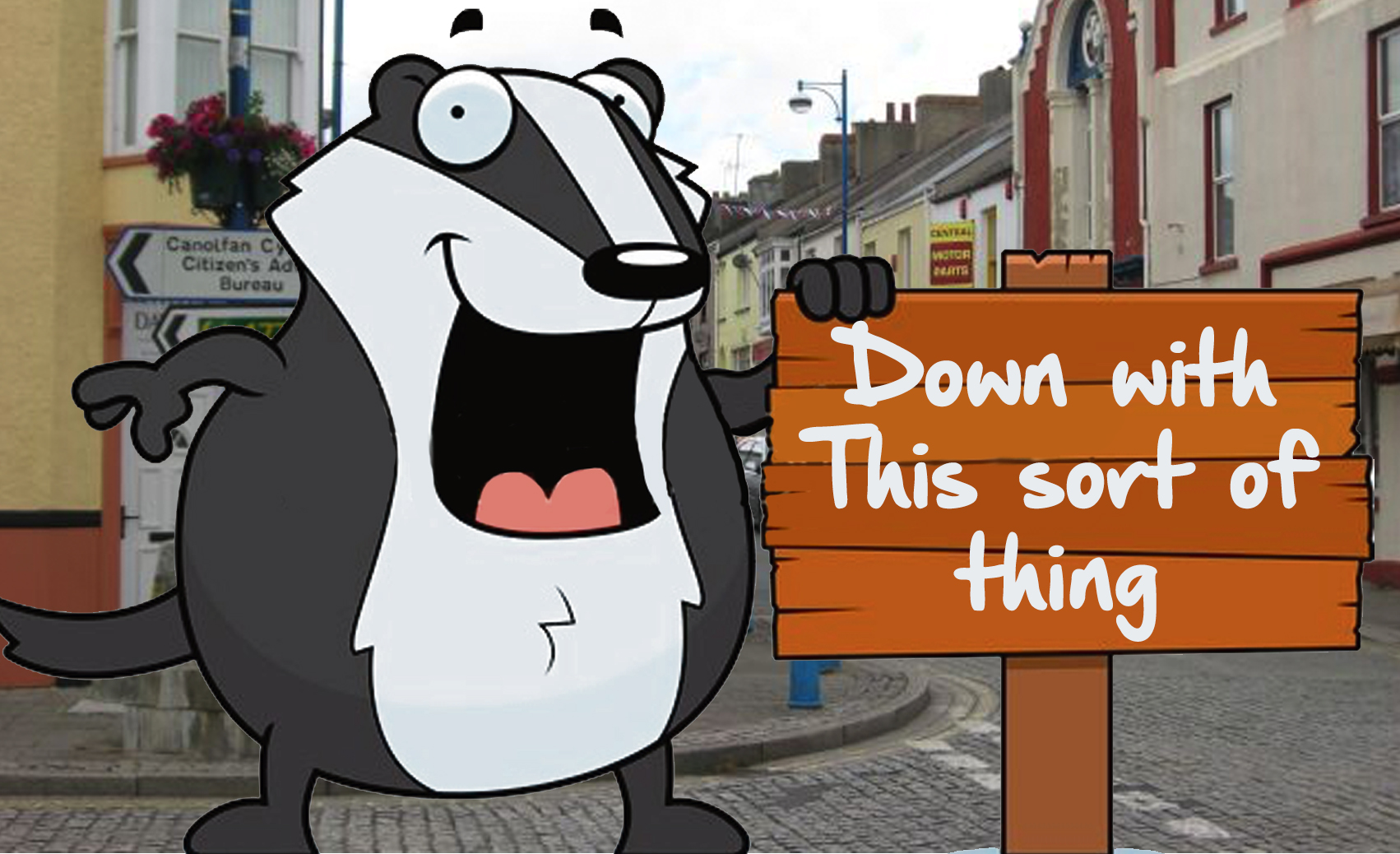Comment
Comment: Badger and the Resistible Rise of Outrage

BADGER sometimes wonders whether people care enough to read researched pieces in favour of getting their kicks at online outrage magnets.
Social media’s use and abuse have poisoned debate. They’ve given impetus to small-minded bigots’ voices on all sides of politics.
Instead of bringing people together, it’s driving them into smaller units. Those cliques are chosen by algorithms which record your personal data and your interactions on platforms like Twitter, Facebook, and YouTube.
The algorithms drive you more and more towards traffic they ‘think’ might appeal to you. By showing you advertisements that promote products and services you’ve expressed interest in, algorithms generate income.
Try shopping online for car insurance… see what adverts pop up on Facebook next.
For one notorious example: Britain First – a neo-Nazi front – share posts on the lines of ‘I support our brave veterans, share and show your support’. Share it and eventually, even if you don’t, someone you share it with might buy the merchandise – the badge, the t-shirt – and buy into the underlying creed.
Algorithms comb your data – with your permission. The software identifies where you’ve been online; what you’ve looked at, and whether anything stands out as gelling with the bank of advertisers waiting to pounce on you with ‘offers tailored for you’.
You end up trapped in an echo chamber. You hear views which a computer programme thinks you ought to like. The intensity of the targeting narrows down your world view by degrees.
For example, a few years ago for the purposes of research on the rise of far-right parties – particularly the BNP and their associated exclusive brethren – Badger created a false online ID and browsed the net, Twitter, and Facebook to gather information for a possible article on the methods used to ‘get’ to people online. He did the same with left-wing groups using a different identity.
It was an experience Badger found illuminating and depressing.
For a start, the algorithms’ power back then was nowhere near as powerful as now. Still, Badger was inexorably guided to pages, groups, and forums promoting extreme positions on both the right and the left. For factionalism and racism, the extremes were almost indistinguishable.
The right hated everyone, but especially Muslims and anyone to the left of Genghis Khan; the left hated everyone, but especially Jews and anyone to the right of Leon Trotsky.
The extreme right hated other factions of the extreme right. The radical left hated different sections of the extreme left. Their squabbling showed Badger that, wherever logic is replaced by blind faith, you can find someone prepared to argue over how many of their comrades can dance on the head of a pin.
And not a big pinhead, either.
Let’s look at what happens.
Suppose you share a link to something you disapprove of and tag the person who’s offended you. In that case, you might imagine you are demonstrating your disapproval and showing your opposition to whichever view you find repellent.
You are wrong. You are spreading that person’s message and the algorithms driving social media will register your interest as promoting that post.
As a working example, Badger will illustrate the issue from a Pembrokeshire standpoint. For the purposes of this exercise, Badger’s personal views are immaterial.
Pembroke Dock Central County Councillor Paul Dowson is the centre of some online attention.
Some who find his politics repulsive. Others enthusiastically endorse him.
Those who deride the Councillor do him a massive favour by repeatedly mentioning and tagging him in their posts. Those who think the Councillor is somehow brave for saying what he does do him a favour by often mentioning and tagging him in their Facebook posts. On the other side of the fence, those who support the Councillor do his opponents a massive favour by tagging them in their Facebook posts.
It’s a relationship founded on mutual and reciprocal hatred.
Although the Councillor benefits from the exposure, the ultimate beneficiary is Facebook, which monetises your page views.
If his opponents ignore him, that will leave only his supporters singing his praises to each other. Algorithms place a lower value on those interactions than apparently random bursts of attention from those who neither follow nor support him.
What Councillor Dowson’s views on ANYTHING are utterly immaterial to the process. On the one hand, he could say he wants to deport everyone whose skin colour comes after taupe on the Dulux colour chart. In his next post, he could say he wants a mosque built in every town to welcome Muslim migrants to the UK.
What he SAYS doesn’t matter to your computer or the platforms you use to view them. It doesn’t matter whether you read his thoughts with open-mouthed shock or adoration. The algorithms are both smart and stupid. All they measure is the response from others.
It’s called a web for a reason. It’s a series of connections between different nodes. If you connect at point A, you also connect to points B, C, D and beyond. Algorithms like ‘rich media’ – photographs, video, podcasts; so, join the points (nodes) to create online influence. And once you are recognised as an influencer, you’re on the way to making money.
Interview a Holocaust Denier, and they’ll share it. Their followers will share it. Suddenly, you’re one of the UK’s top ten Flag-shaggers.
Much-loved racist neo-Nazi thug and fraudster ‘Tommy Robinson’ did it with his PayPal patriotism. Others have followed the same primrose path, albeit on a much smaller scale.
Readers: if you want to really make that sort of thing go away, you face two choices: both preclude debate.
Firstly, you can ignore it and hope it all goes away. Badger calls this the Blair-Cameron approach. It won’t work; or Secondly, the 57 varieties of outraged get smart, focus locally, address what others are concerned about, and stop whining.
It’s what political parties used to do before the world disintegrated into single-issue groups arguing over pronouns, history, and the meaning of abstract concepts like ‘sovereignty’.
Politics for grown-ups using modern technology… it could be worth a punt. Don’t form a committee to discuss it. Just do it.
It’s hardly the most outrageous suggestion you’re likely to read this week.
Comment
Holocaust Memorial Day: The gas chambers didn’t just appear

Opinion piece by Herald editor Tom Sinclair
TODAY is Holocaust Memorial Day, January 27, 2026. Across Wales we remember the six million Jews murdered by the Nazis, and the Roma, disabled people, gay men and women, political opponents, and many others the regime labelled undesirable. We light candles, say “never again”, and tell ourselves that kind of evil is locked in the past.
But if remembrance ends at the gates of Auschwitz, we miss the real lesson.
The Holocaust did not begin with gas chambers or cattle trucks. It began in ordinary places, shops, streets, pubs, council chambers, with words that stripped people of their humanity, laws that pushed them to the margins, and propaganda that turned neighbour against neighbour. It began when ordinary people started seeing others as problems, as threats, as not really belonging.
It began with politicians pointing fingers at who to blame.
With newspapers branded enemies of the people.
With courts and rules quietly bent.
With minorities held responsible for hard times.
With cruelty sold as common sense.
And above all, it began with silence.
Last week in Milford Haven, I saw that silence in action.
A shopkeeper, someone who came here from another country, set up a business, pays his way and serves the town, was racially abused inside his own shop. He tried to stop a man walking out with unpaid beer. For doing his job, he was told to “go back home”, told he was not welcome. The thief responded by sweeping stock off the shelves and smashing it onto the floor.
I asked why he did not ring the police. His answer came straight away. “What’s the point? They won’t do anything. It’ll just happen again tomorrow.”
That exchange stuck with me. Not because it was uniquely shocking, but because it felt horribly familiar. No new laws. No uniforms. No symbols. Just raw contempt, casual racism, and the shared understanding that nothing would come of it. A man contributing to the community was made to feel like an outsider in his own workplace, and he had already lost faith that anyone would step in to protect him.
This is how it starts. Abuse becomes normal. Victims stop reporting because experience has taught them the system will not respond. Prejudice is dismissed as “just words” or “banter”. Indifference takes hold.
We are often told not to make comparisons, not to be alarmist, not to link today with that past. Fair enough. History does not repeat itself in neat patterns. But it does move in stages, and the most dangerous stage is the one people fail to notice. The slow normalisation of division, cruelty and disregard.
In towns like Milford Haven, Haverfordwest and Pembroke Dock, places built on hard work and looking out for one another, we know what community means. We have weathered closures, recessions and hardship together. We do not turn away when one of our own is targeted.
Yet when a shopkeeper loses faith that the police or the public will stand with him, something vital erodes. When hate goes unchecked, the ground is quietly prepared for worse.
Holocaust Memorial Day is not about guilt. It is about vigilance. It asks the hardest question of all. Not what monsters once did, but what ordinary people allowed by doing nothing.
The worst crimes in history were not announced in advance. They were built quietly, policy by policy, lie by lie, while too many looked the other way.
That is why we still remember today. And why, in our Welsh towns, remembering must mean refusing silence.
If you see it, say something. If you hear it, challenge it. If someone is targeted, stand with them. Because “never again” only holds if we make it hold, here and now, in the places we live.
Comment
When the System Decides: AI, authority and the quiet loss of human judgment

OPINION: BY PAUL DOWSON
ARTIFICIAL INTELLIGENCE is no longer a future technology. It is not waiting for legislation, ethical consensus, or public debate. It is already here, embedded in systems that exercise immense power.
AI is in our warplane cockpits.
That single fact should change the entire conversation. This is not about chatbots or convenience. It is about authority: who holds it, who hides behind it, and who is left accountable when things go wrong.
In modern military aircraft, AI systems assist with navigation, threat detection, targeting support, and reaction timing. They operate at speeds no human can match. The case for their use is compelling. Machines do not panic, tire, or hesitate. In combat environments, hesitation costs lives.
So why should we be concerned?
Because the real risk of AI is not that it will suddenly develop malicious intent. That idea belongs to science fiction and distracts us from a far more ordinary, and far more dangerous, reality. AI is increasingly treated as neutral.
Neutral systems are trusted. Trusted systems stop being questioned. And what is no longer questioned quietly becomes authority.
We already live under layers of process. Decisions are routinely explained away with phrases like “policy”, “procedure”, or “the system”. AI is the most powerful extension of this trend yet. It produces outcomes while making it harder to say who actually decided.
In civilian life, this is already happening in areas such as welfare and public services. Eligibility decisions are increasingly shaped by automated scoring systems. Someone can be denied support, flagged for investigation, or pushed down a queue not because a person made a judgment, but because “the system says” they do not qualify. The outcome feels final, yet the assumptions embedded in the model are rarely visible, and almost never open to meaningful challenge.
When responsibility is pushed into a system, accountability evaporates. No one “decided”. The model ran. The process was followed.
I have seen first-hand how “objective” systems can be steered toward particular outcomes without anything that looks like corruption. It does not require conspiracies or secret meetings. It happens through design: what data is used, what is left out, how success is defined, how risk is weighted.
To the public, the result looks inevitable.
To those who understand the system, it is engineered.
AI magnifies this effect dramatically. Once systems become complex enough, very few people can meaningfully challenge them. “The model says” becomes the end of the conversation. Questioning outcomes starts to sound like ignorance rather than scrutiny.
Supporters of AI are right: automation has already saved lives. Aircraft are safer today precisely because computers assist, and sometimes override, human pilots. In dangerous environments, AI can see more, calculate faster, and respond sooner than any person ever could.
Refusing to use such tools would be irresponsible.
That argument deserves to be taken seriously. But it still misses the deeper issue.
What starts as assistance becomes reliance.
Reliance becomes deference.
And deference becomes authority.
Over time, humans stop deciding and start supervising. The human becomes the back-up. Judgment becomes confirmation. The key question quietly shifts from “Is this the right decision?” to “Is there any reason to override the system?”
That shift matters. Because once humans are no longer the primary decision-makers, responsibility becomes a formality rather than a reality.
We are told AI can be audited. In theory, yes. In practice, real scrutiny requires expertise, access, and the power to challenge outcomes. Most people, including many decision-makers, do not have these. For them, the system’s output is effectively unquestionable.
And systems are never neutral. They reflect priorities: military objectives, political pressures, funding decisions, strategic advantage. AI does not remove human values from decisions. It buries them beneath complexity.
What is happening in military aviation will not remain confined there. The same logic is already spreading into finance, policing, welfare systems, hiring decisions, and border control. Everywhere AI is positioned as an objective arbiter, responsibility becomes harder to locate and harder to contest.
The greatest danger is not that machines will decide badly. It is that humans will lose the habit, and the authority, of deciding at all.
I support AI. Its potential is extraordinary. Used properly, it can enhance human judgment, reduce error, and save lives. But if we fail to shape how it is deployed, we risk building systems that do not supplement us, but quietly replace us.
AI does not need consciousness to reshape power.
It only needs our trust.
And trust, once handed over, is rarely reclaimed.
Author bio

Paul Dowson is a former independent county councillor in Pembrokeshire (2017–2022) and has spent his career in business management and communications. He supports the adoption of artificial intelligence where it strengthens human decision-making, but argues it must never become a substitute for accountability or judgment.
Comment
Should the King cancel the US state visit in April? Yes — and he should say why

OPINION – BY TOM SINCLAIR, EDITOR
THE KING is not a politician. He is, however, the Commander-in-Chief of the British Armed Forces. That distinction matters, because it draws a line between everyday diplomacy and something more fundamental: respect for service, sacrifice, and the people this country asks to stand in harm’s way.
On that basis, the scheduled state visit to the United States in April should not go ahead as planned. It should be postponed indefinitely — and the reason should be made clear, quietly but firmly: Britain will not wrap ceremonial honour around rhetoric that demeans those who serve.
That is the crux of it. The issue is not a petty spat, a bruised ego, or an argument about “who said what” on social media. It is the principle of how allies speak about allied forces — and whether the United Kingdom is prepared to smile, toast and wave through remarks that, in the eyes of many serving personnel, veterans, and military families, amount to a straight insult.
You can hear it in the public reaction. People who would rarely write to a King or comment on foreign policy are suddenly saying the same thing in plain language: if the Head of the Armed Forces carries on regardless, it feels like a slap in the face to those who “stood the line” — and to the families of those who did not come home. Some are calling for a postponement “until there is an apology”. Others say: don’t postpone — cancel. Underneath the anger, there is a consistent instinct: dignity matters, and so does loyalty.
Now add the awkward history. Not so long ago, Donald Trump received the full ceremonial treatment in Britain. A banquet. The gold-trimmed theatre of state. All presented as diplomatic necessity, above politics, in the national interest.
Did it work? Did it moderate language, build respect, reduce volatility, improve conduct? If anything, it taught the opposite lesson: that Britain will keep offering prestige even when it gains nothing in return. The Crown’s soft power was put on display, and the recipient treated it like another trophy.
That is why doing it again now would be worse than a mistake. It would be a pattern.
Supporters of the trip will reach for the familiar argument: Britain’s relationship is with the United States, not with one individual. And that is correct. Defence, intelligence, trade and security cooperation are too important to be thrown around as gestures.
But a state visit is not the machinery of government. It is the highest honour we can confer. It is symbolism in its most potent form. It is an embrace.
And there is a difference between continuing diplomacy and offering ceremony.
Britain can and should continue the serious work through ministers, ambassadors, defence chiefs and officials. That work is robust enough to survive a postponement of pageantry. What it cannot survive — at least not without cost — is the impression that the country’s top symbol of service is prepared to overlook contempt directed at service.
There is also a constitutional realism that needs saying out loud. The King does not freelance. He acts on ministerial advice. That means the responsibility for this does not sit with one man in one palace. It sits with the government of the day. If the visit goes ahead, it will not be interpreted internationally as a “neutral royal engagement”. It will be interpreted as a British national choice.
Which raises a simple question: why would Britain choose, voluntarily, to place its Commander-in-Chief into the middle of America’s partisan furnace — where every handshake becomes a headline and every photograph becomes a message?
The monarchy’s strength is that it is not supposed to take sides. Yet the more polarised the environment, the harder neutrality is to maintain. A state visit in April risks being treated as an endorsement by one camp and a provocation by the other. That is not only unfair to the King; it is dangerous for the institution. No head of state should be used as a campaign prop, least of all one whose constitutional role depends on being above the fight.
So what should happen?
The government should advise postponement on grounds that are unarguable and non-partisan: respect for allied forces and the need to keep the Crown out of domestic political controversy abroad. The Palace should keep the language measured: a desire to reschedule at a more appropriate time, in a way that reflects the enduring UK-US relationship and the importance of mutual respect between allies.
And if there is to be a condition for reinstating the visit, it should be simple: a clear, public reaffirmation of respect for NATO service personnel and the sacrifices made by military families. Not a grovelling performance. Not a media circus. Just a statement of basic decency that any ally should be able to make without choking on it.
Some will say Trump never apologises. That may be true. But the point is not to choreograph an apology. The point is to stop granting honours as if they are automatic.
Because Britain has already tried the “butter him up and hope for the best” approach. We’ve seen the banquet. We’ve watched the pageantry. We’ve heard the rhetoric continue.
At some stage, a grown-up country has to decide what it will and won’t dignify.
If the King is the head of our armed forces in name, then he must be the head of our armed forces in meaning too. That means he cannot be asked to raise a glass to a man whose words have demeaned the very people the Crown is meant to honour.
Postpone the state visit. Keep the diplomacy. Protect the institution. And, above all, stand by the men and women who stood for us.
-

 Health4 days ago
Health4 days agoConsultation reveals lack of public trust in health board
-

 News6 days ago
News6 days agoCaldey still unsafe, survivors warn — despite Abbey’s reform claims
-

 Community5 days ago
Community5 days agoPembrokeshire students speak at national Holocaust Memorial Day event
-

 News6 days ago
News6 days agoKurtz raises Gumfreston flooding in the Senedd as petition deadline nears
-

 Entertainment7 days ago
Entertainment7 days agoRapunzel brings festive magic to Torch Theatre
-

 Crime6 days ago
Crime6 days agoMan denies murdering brother as jury hears of ‘ferocious attack’ at Morriston flat
-

 Community7 days ago
Community7 days agoStorm Chandra: Morning impacts across Pembrokeshire
-

 Education5 days ago
Education5 days ago‘Vulnerable teen’ questioned by police at Milford Haven School


































